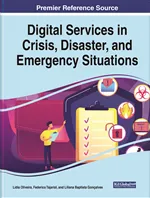

Source Title: Digital Services in Crisis, Disaster, and Emergency Situations
Copyright: © 2021 |Pages: 21
ISBN13: 9781799867050|ISBN10: 1799867056|ISBN13 Softcover: 9781799867067|EISBN13: 9781799867074
DOI: 10.4018/978-1-7998-6705-0.ch004
Abstract
This study presents an information monitoring system: SIGDesastre. It is a method of monitoring the various sources of information available on the internet. The monitoring scenario is the failure of the dam in Mariana, Brazil. This event was considered the biggest socio-environmental disaster in the country. The creation of SIGDesastre involves the identification of the sources to be monitored, an automated search system for keywords in these pre-registered sources and the visualization of the results in a friendly environment. The use of information monitoring on the internet is considered an important tool for the post-disaster risk communication process. The monitoring of information on the internet is believed to be a potential device to support managers in institutional decisions and in the formulation of public policies. Also, for the affected population, they will be able to expand access to information about the actions being taken by the actors involved.